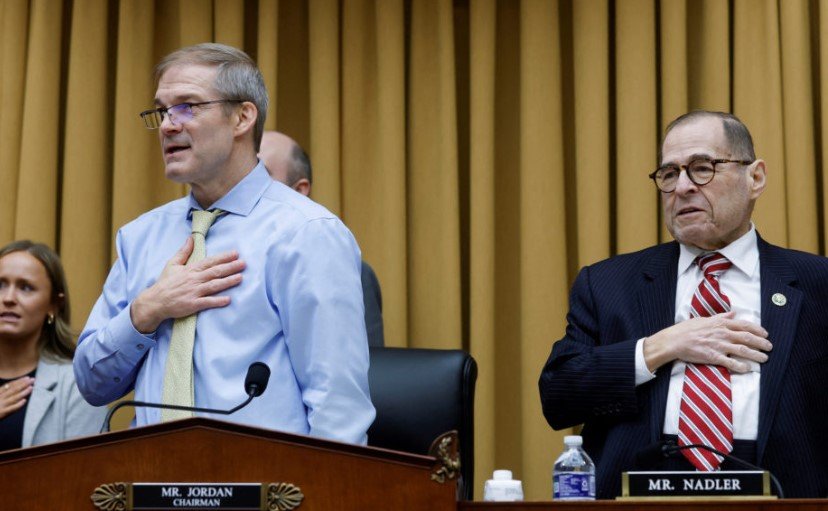House Judiciary Committee Republicans voted down a Democratic push on September 17, 2025, to subpoena top executives from four major banks tied to Jeffrey Epstein’s financial dealings. The move came during an oversight hearing with FBI Director Kash Patel, blocking efforts to uncover details on over $1.5 billion in suspicious transactions linked to the late sex offender.
Key Events in the Committee Hearing
Democrats aimed to force a vote on subpoenas for bank CEOs to reveal records about Epstein’s money flows. The effort failed in a near party-line vote, with only one Republican, Rep. Thomas Massie from Kentucky, siding with Democrats.
This hearing focused on FBI oversight, but Epstein’s case took center stage. Patel claimed the FBI could not release many files due to legal limits, a statement critics called misleading. The session lasted five hours and highlighted deep partisan divides.
Republicans argued the subpoenas were unnecessary and politically motivated. They pointed to ongoing investigations and said the focus should stay on broader FBI accountability.

Banks and Executives in the Spotlight
The proposed subpoenas targeted leaders from JPMorgan Chase, Bank of America, Deutsche Bank, and Bank of New York Mellon. These institutions reportedly flagged massive suspicious activities connected to Epstein over years.
JPMorgan Chase CEO Jamie Dimon expressed regret over any past ties to Epstein. He told reporters the bank would comply with legal demands if required.
Deutsche Bank has faced prior lawsuits for enabling Epstein’s operations. Bank of America and Bank of New York Mellon also appeared in reports of unusual transactions.
Here is a quick overview of the banks involved:
| Bank Name | CEO Involved | Reported Suspicious Amount |
|---|---|---|
| JPMorgan Chase | Jamie Dimon | Part of $1.5 billion total |
| Bank of America | Brian Moynihan | Part of $1.5 billion total |
| Deutsche Bank | Christian Sewing | Part of $1.5 billion total |
| Bank of New York Mellon | Robin Vince | Part of $1.5 billion total |
These details stem from court filings and investigations showing how banks handled Epstein’s accounts.
Epstein’s Financial Web and Past Scandals
Jeffrey Epstein, who died in 2019 while facing sex trafficking charges, built a vast network through high-profile connections. His financial dealings involved millions moved through these banks, often flagged as suspicious but not always acted upon.
Investigations revealed Epstein used his wealth to fund abusive activities. For instance, settlements with victims have cost banks like JPMorgan hundreds of millions in recent years.
Recent court documents from the U.S. Virgin Islands case showed over 9,000 transactions totaling more than $2.4 billion paid to Epstein-related people between 2005 and 2019. This adds to the push for transparency.
Experts say these banks may have overlooked red flags to keep lucrative clients. Logical reasoning suggests stronger oversight could have stopped some harm earlier.
Reactions and Political Fallout
Democrats blasted the vote as an attempt to hide the truth. Rep. Jamie Raskin from Maryland led the charge, calling for subpoenas to expose the full money trail.
Republicans defended their stance, saying the committee should prioritize other issues like national security. Chair Jim Jordan from Ohio steered the hearing away from Epstein details.
Public sentiment on social media shows frustration. Many users question why powerful figures seem protected, fueling calls for accountability.
One Republican broke ranks, highlighting internal party tensions. This could signal broader efforts to release more Epstein materials.
The vote ties into ongoing debates about financial crimes and elite networks. It echoes past scandals where banks faced scrutiny for lax practices.
What This Means for Future Probes
Blocking the subpoenas slows the investigation into Epstein’s enablers. Victims’ advocates worry it protects those who profited from his crimes.
However, separate efforts continue. Rep. Massie pushes for Justice Department releases, and lawsuits against banks persist.
This event connects to 2025 trends in financial transparency. With rising cyber threats and money laundering cases, experts predict more scrutiny on banks.
Possible outcomes include renewed motions or Senate involvement. Observers note that public pressure might force action in coming months.
Broader Context and Related Developments
Epstein’s case links to other high-profile probes, like those involving his associate Ghislaine Maxwell, convicted in 2021. Her appeals and related filings keep the story alive.
In 2025, financial regulators have ramped up rules on suspicious activity reports. Banks now face stricter penalties for failures, as seen in recent fines totaling billions.
Key factors in Epstein’s network include:
- High-net-worth clients evading scrutiny
- International transfers complicating tracking
- Ties to influential figures in business and politics
These elements explain why the case remains relevant. Logical analysis shows that full disclosure could prevent future abuses.
As this story develops, share your thoughts in the comments below. What do you think about the committee’s decision? Spread the word if you found this breakdown helpful to keep the conversation going.






